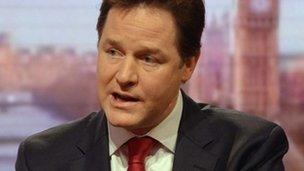Nick Clegg aims to stop 'gaming' of tax systems in developing world
- Published

Mr Clegg will meet the president of Mozambique and the prime minister of Ethiopia
Action is needed to stop the "gaming" of developing countries' tax systems undermining aid spending, Deputy Prime Minister Nick Clegg has said.
Ahead of a visit to sub-Saharan Africa, Mr Clegg said tax avoiders were making a "mockery of governments in the developing world".
He will meet political and business leaders in Ethiopia and Mozambique in his first official visit to the region.
The trip is a bid to boost ties with Africa during the UK's G8 presidency.
He plans to argue that the G8 - made up of countries which have, historically, been the richest in the world - can help African nations by focusing on tax, trade and transparency.
Presidency of the G8, comprising France, the US, Russia, Japan, Germany, Italy, Canada and the UK, rotates between member states. The UK's presidency started at the beginning of the year.
'Vicious cycle of inequity'
Prime Minister David Cameron has said his priority during the presidency will be the global economy.
This includes a focus on supporting free trade, tackling tax evasion and encouraging greater transparency and accountability.
UK businesses operating in Africa will join Mr Clegg on his trip.
The deputy prime minister wants developing countries to be able to increase their tax revenues and build a stable business environment for trade.
"Many of the difficulties that governments face in the developing world are becoming increasingly common in the developed world," he said.
"For too long, the developed world ignored the way in which tax revenues, which rightfully belonged to developing countries, disappeared as people exploited different tax regimes, and made a mockery of governments in the developing world. We must work together to overcome it.
"To disrupt the vicious cycle of inequity in the systems of tax and trade, we must first create a level playing field whereby responsible and thriving companies are attracted to trade and do business in a fair and transparent way.
"As the UK will meet its promise to spend 0.7% of GNI [gross national income] on international aid in 2013, it is vital that the benefits of aid are not wiped out by losses sustained by multi-nationals or individuals gaming countries' tax systems."
'Action not words'
During his visit Mr Clegg will meet President Armando Guebuza in Mozambique and Prime Minister Hailemariam Desalegn in Ethiopia, as well as leaders from the African Union and ambassadors from across Africa.
Lynne Featherstone, minister for international development who is travelling with Mr Clegg, said: "In the year that we chair the G8, it is right that we use our aid and expertise to boost tax revenues in the poorest countries and help them to stand on their own two feet.
"Helping developing countries to collect taxes means they can improve their own public services such as health and education. It also helps attract the investment and trade they need to grow and develop."
Melanie Ward, head of advocacy at campaign group ActionAid, said: "Nick Clegg is absolutely right to focus on the impact that tax dodging has on developing countries. The scale of the problem is enormous.
"A real assault on tax avoidance has the potential to transform the fate of developing countries for good.
"But we need action not words from Nick Clegg and David Cameron.
"Only a landmark new G8 agreement to destroy the secrecy offered by tax havens, coupled with Budget measures to force British companies to open up about their tax avoidance can deliver the change that is so badly needed."
- Published23 January 2013
- Published2 January 2013
- Published1 January 2013